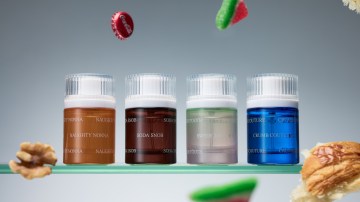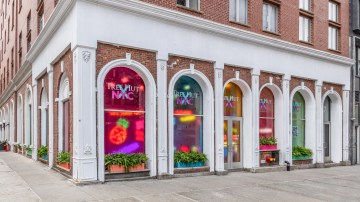This week, I checked in with beauty and wellness brand leaders to learn how they’re offsetting the cost of tariffs without increasing prices. Additionally, executive shakeups at Sephora, Novo Nordisk and Saltair; plus, P&G, Kering Beauté, L’Oréal Group, and Unilever report earnings.
Beauty brands are getting creative to avoid raising prices
President Donald Trump’s long-awaited global tariffs went into effect on Friday, with the rate on some trading partners landing higher than many brands can absorb alone. This includes a 50% import tariff on Brazil, 34% on China, 25% on India and Mexico, and 15% on the European Union, South Korea and Japan.
Many brands, like E.l.f. Beauty, Saie, Glow Recipe and Dove, are raising prices to offset the expense. However, the majority of brands Glossy spoke to are doing everything they can to avoid price increases this year in an effort to retain goodwill with consumers.
“There are always things that you can do as a company to cut back,” said Renée Rouleau, founder and CEO of Renée Rouleau Professional Skin Care, a 29-year-old line that sells DTC and through estheticians. “It’s such a delicate time right now; I would never have that knee-jerk response and panic to have our customers have to pay for [these new tariffs].”
Rouleau has only done five price increases in nearly three decades. She told Glossy that maintaining pricing is crucial for loyalty.
Meanwhile, Chase Polan, founder and CEO of Kypris Beauty, told Glossy that she “will need to raise prices eventually, but we want to do it really thoughtfully because people are already stressed about their finances right now.” Kypris is a 14-year-old skin-care brand sold DTC, at spas, and through retail partners like Neiman Marcus, Bloomingdale’s, The Detox Market and Amazon Luxury.
“[Maintaining our prices now] strengthens our relationship with our customers; It shows that we’re [focused] on value,” said Judah Abraham, founder and CEO of Slate Brands, an NYC-based beauty company behind fragrance brands like Modern Magic, Naked Beauty, Hue by Haley and Tracey Anderson Fragrance. “We believe that not raising prices will be a more sustainable action and more profitable for the business in the long run.”
But altering a brand’s P&L to offset tariffs is not always an easy task. Brands Glossy spoke to are currently streamlining operations, modifying ordering and fulfilling strategies, downsizing office space, and cutting down on marketing spend.
For example, Rouleau decided in July that she would downsize the company’s 10,000-square-foot Austin, Texas office and warehouse space to one-half the size, and half the cost. “The office will be cozy, so it may mean some of us work from home more,” Rouleau said.
Rouleau has been in business for 29 years, owns 100% of the company and has under 20 employees. She’s long been adaptable to changing economies and consumer needs. For this move, she’s only planning to sign a three-year lease instead of a standard five- or 10-year lease. “We can rent a storage space or another small office space if we need it,” she said. “Everything can be figured out.”
Rouleau looked into changing its contract manufacturers and component vendors but came up empty-handed on cost savings. She told Glossy that any savings were negligible and not worth the risk associated with changing manufacturing. She has, however, found some cost savings with larger orders of globally sourced packaging.
For Kypris Beauty, Polan started the brand’s cost-saving endeavor by looking at its marketing mix. After a rigorous analysis, the company decided to reduce its sampling budget and began to decline participation in retailer gifting and promotion, which comes with costs that eat into margins. “GWPs [gift with purchase] are great [for our customer], but general sampling doesn’t change their purchase pattern, so we stopped that,” Polan told Glossy.
Polan’s goal is to maintain pricing in the near term, which means she is cutting into some margins. The same goes for GuruNanda, which is TikTok Shop’s top-selling oral care brand and a recent addition to Ulta Beauty’s wellness shop.
“In an environment where people are actually making their prices go up, this is a unique situation where we have actually reduced our cost,” said Puneet Nanda, founder and CEO of GuruNanda. He told Glossy that the move to stay competitive is driven by retailers like Walmart and Target that report an increase in consumer price sensitivity. Nanda is taking the hit on profits in the near term by lowering GuruNanda’s margins.
Earlier this year, when news of the tariffs broke, Slate Brands’ Abraham explored American vendors that could potentially replace imported packaging, but even with the tariffs, components from India and China were still cheaper.
However, its ordering strategy has evolved. “Working with manufacturers on more creative strategies [has helped offset tariffs],” said Abraham. ”We’re shipping over larger quantities, consolidating shipments across products and across brands, and not necessarily producing and holding as many goods [we see as] risky for holiday.” Instead, the company is stocking up on top-selling SKUs.
“Consumers are educated [on tariffs and inflation], and as everything goes up, they’re going to have questions on why certain brands are not raising [prices],” he said. “It shows that brands that didn’t raise prices are clearly trying [to work for their consumers].”
Executive moves:
- Alison Hahn, svp of makeup and fragrance at Sephora, is set to retire at the end of the month. She has been with the company for more than 14 years. Her CV also includes Restoration Hardware, Gap and Cost Plus World Market. Sephora is set to restructure its merchant team to support the change.
- Maziar Mike Doustdar will take over as CEO of Novo Nordisk, the Danish maker of GLP-1 Ozempic and Wegovy, on August 7. He has been promoted from his previous role as evp of international operations. This move is part of a turnaround plan after the company lost $93 million in market share due to a sales slump.
- Saltair, the body-care brand launched in 2022 by The Center beauty incubator and model Iskra Lawrence, has made new executive hires. Rachel Shelowitz has come on as CEO, and Erin Sale is the new CMO. Shelowitz joins the company from Lawless Beauty, where she was CEO, and Sale joins from Murad, where she was global CMO.
- Shailesh Jejurikar is the next CEO of Procter & Gamble, maker of beauty and personal care brands like Olay and Gillette. He is set to replace Jon Moeller, who has been with the company for more than three decades. Jejurikar will take over in early 2026; he is currently the company’s COO. On Tuesday, the company announced 2% growth in net sales for the fourth quarter of 2025.
- Herbivore welcomed Troy Puccia to its executive team last week to serve as CFO and COO. Britany LeBlanc joined as CEO in 2024 from Supergoop sunscreen, while Puccia’s CV includes Nest and Estée Lauder Companies-owned Bumble & bumble.
News to know:
- Kering, owner of luxury fashion brands like Gucci, Bottega Veneta and YSL, reported a 16% decline in revenue for the first half of 2025. This drop, partially caused by low Gucci sales, was offset by Kering Beauté, which grew its sales by 9% during the half. Creed fragrance was a bright spot: Its sales were up 12% during the second quarter.
- Unilever, maker of mass personal care brands like Dove, Vaseline and Simple skin care, reported 3.8% sales growth for its second quarter on Thursday. Wellness products from Liquid I.V. and Nutrafol were a bright spot in its sales. “Looking ahead, our priorities are clear: more beauty and wellbeing and personal care, disproportionate investment in the U.S. and India, and a sharper focus on premium segments and digital commerce,” CEO Fernando Fernandez said in a statement.
- Colgate-Palmolove, owner of Elta MD, Hello oral care, Speed Stick, Tom’s toothpaste and PCA Skin, reported a 1% net sales increase on Friday. Sales in Europe grew the most, up 7.8%, while Asia and Eurasia saw an 8% sales jump. Sales in latin America dropped by 4.8%, while North America was down 1%. The conglomerate’s global market share of toothpaste is 41.1%, according to the company.
Stat of the week:
The U.S. added 73,000 new jobs to the economy in July, according to data released Friday by the Bureau of Labor Statistics. This is up from June’s 14,000 new jobs but still under the 100,000 new jobs forecasted by the Dow Jones. Most of this growth comes from healthcare with retail adding around 16,000 new jobs in July.
In the headlines:
Rare Beauty partners with Shopify’s Shop app on scratch-and-sniff OOH fragrance campaign. How Beauty Creations is leveraging nostalgic IP to surpass $84M in sales. How tariffs have upended the back-to-school season. Amazon and Instacart’s former advertising leader is transforming the way Walmart grows. American Eagle and Dunkin’ and the risk of ignoring cultural context in ads.
Listen in:
Krave Beauty isn’t your average K-Beauty brand. Unlike the 12-step skin-care routines Korea is known for, Krave is based on streamlining one’s routine with minimal products that strengthen the skin’s barrier. CEO and co-founder Liah Yoo joins the Glossy Beauty Podcast to discuss her journey building an ethical supply chain — where everyone is treated and paid fairly — for its hero serum, Great Barrier Relief.
Need a Glossy recap?
Led by pro hair-care sales, L’Oréal Group reported 1.6% sales growth during the first half of the year. Beauty’s new favorite way to launch a product? With a blank Instagram grid. As AI changes discovery, Nyx Professional Makeup doubles down on Roblox for brand awareness. Dezi Skin is the latest influencer-founded brand to hit Sephora. Inside Unilever’s AI beauty marketing assembly line — and its implications for agencies.




